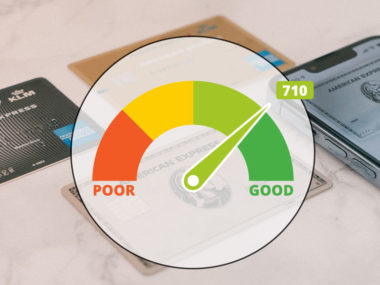
If you’ve ever applied for a loan or a credit card, you know how much credit scores impact the terms of your loan and your likelihood of getting approved. What is good credit? How does your credit score affect the likelihood of you getting approved for a loan? What happens if your credit score is lower than you’d like it to be?
Credit Score Ranges
There are hundreds of credit scoring models that are used by lenders in the financial market. Because of this, it’s entirely possible that you could have hundreds of credit scores depending on the your lender’s criteria. If you’re still not sure what your current credit score is, Credit Karma is a FREE source for that information.
Different Credit Score Models
While it’s impossible to keep track of all of your credit scores, there are some that are used by most lenders that are important to at least be aware of.
The good news for those hoping to borrow is that most agencies look at similar factors when calculating credit scores.
By making payments on time, keeping your credit card balances at a manageable level, and not opening new accounts frequently, your credit score should be in good standing, and stands a chance of improving over time.
FICO
FICO is the most commonly used credit score used when applying for new credit or a loan. FICO scores range from 300-850 and are based on the following factors:
- Your payment history (35%)
- Your total debt (30%)
- Credit history (15%)
- New credit/inquiries (10%)
- Types of credit you have (10%)
Though the formula may seem simple, FICO often makes changes to its model to produce a better reflection of your trustworthiness as a borrower.
To go into further detail the Fair Isaac Corporation (who created the FICO credit scoring system) stated, “You have more than one FICO Score—depending on what type of credit you’re seeking, your lenders may evaluate your credit risk using different FICO Score versions. Auto lenders, for instance, often use FICO® Auto Scores, an industry-specific FICO Score version that’s been tailored to their needs. Most credit card issuers, on the other hand, use FICO® Bankcard Scores or FICO® Score 8.”
Though it may seem confusing at first, these updates can be to the borrower’s benefit. For example, the FICO 9 update allows unpaid medical bills to carry a lower weight than other unpaid debts, as medical debt may not be an indicator of financial health.
VantageScore
The VantageScore is the single largest FICO credit score competitor. The VantageScore was developed by the big three credit bureaus (Experian, TransUnion, and Equifax). Because of this they are able to score 30 million more people than most models.
Like FICO, VantageScore are also working to evolve their credit score process to paint a more accurate picture of an individual’s likelihood to make timely payments and pay back their debts.
In the most recent version of the VantageScore, applicants are scaled on a number between 300-850. In most cases, only the last 24 months of credit activity are reviewed and accounts that are in collections do not factor into your score.
The VantageScore model is based on the following:
- Age and type of credit (Extremely important)
- Credit utilization (Extremely important)
- Payment history (Highly important)
- Total Balances (Considered)
- Recent credit behavior (Considered, but not as important)
- Available credit (Considered, but not as important)
If you use websites like Credit Karma to monitor your credit, you’ll receive the most recent version of the VantageScore.
Why Your Credit Scores Differ
You may receive a different FICO or VantageScore credit score from each of the major credit reporting agencies. Typically this occurs for one of three reasons.
- Scores are from different dates.
- Scores are calculated using different scoring models.
- Scores are calculated using different credit reports.
In order to get the most accurate results, it’s important that you follow those three criteria. But remember, lenders look at different scores and place weight on different criteria. These credit scores simply give you an idea of what lenders see when looking at your credit report.
What is the Importance of Credit Score Ranges?
Your credit score helps lenders determine the risk involved with approving your loan. Having a low score doesn’t necessarily mean that you won’t be approved, but lenders may change the terms of your contract in order to mitigate risk.
For a score with a range of 300-850, a credit score that is above 700 is generally accepted as good. But there is a range of scores that both FICO and VantageScore use.
FICO Score ratings are as follows:
- Poor: 300-579
- Fair: 580-669
- Good: 670-739
- Very Good: 740-799
- Exceptional: 800-850
VantageScore ratings are weighted slightly different:
- Very Poor: 300-549
- Poor: 550-649
- Fair: 650-699
- Good: 700-749
- Excellent: 750-850
Depending on where you land on the spectrum, you may be impacted in a number of ways. Those who have very poor credit may be required to pay a fee or deposit before the application will be considered, while others might not be approved for credit at all. In contrast, applicants with exceptional or excellent ratings are at the top of the list for the best rates from their lenders, as they have shown that they are fiscally responsible and aren’t likely to default on their loans.
The bottom line is that having a low credit score isn’t the end of the world, but taking steps to repair your credit will yield better results when applying for loans in the future.
Image Source: https://depositphotos.com/







